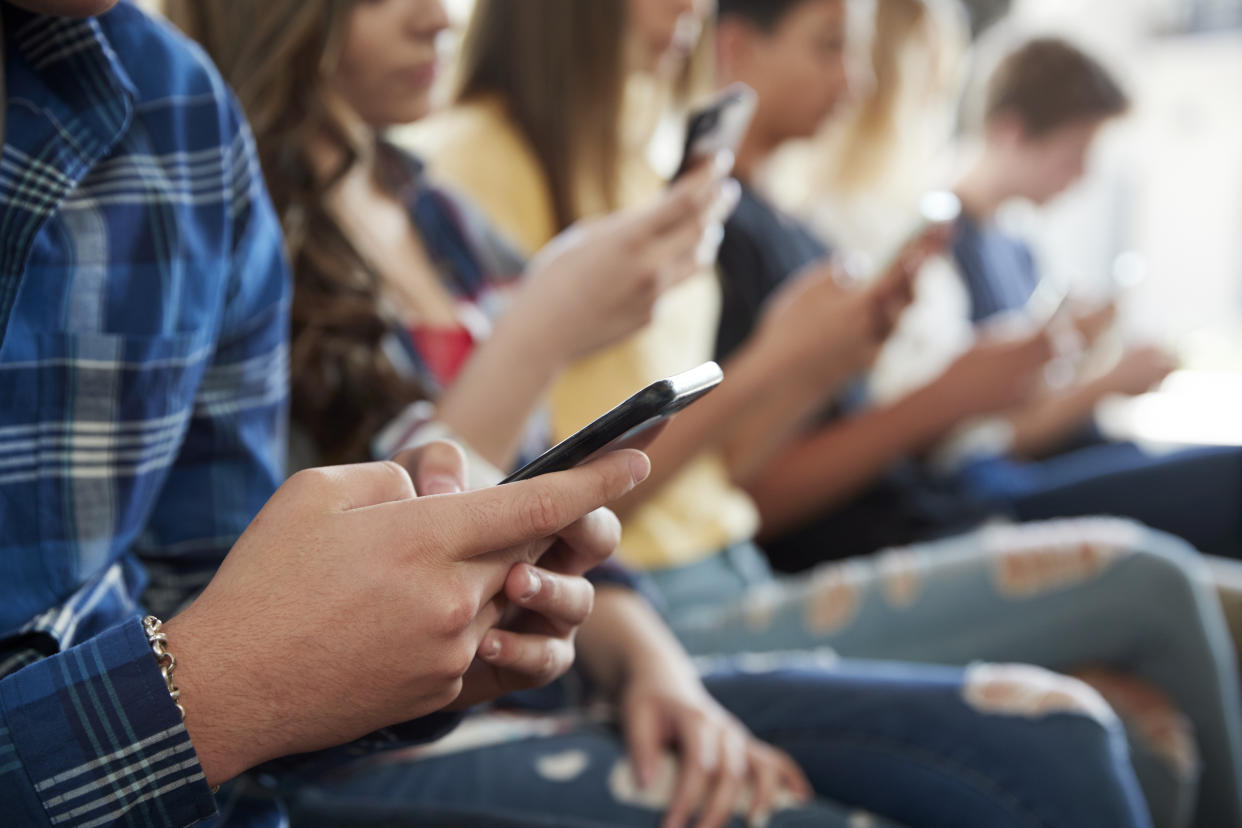High school bans student cell phones and teachers are ecstatic: 'They’re engaged with the real world instead'

A high school in Anchorage, Alaska banned all student cellphones from classrooms during school hours, much to the chagrin of its students. But weeks after the policy was implemented at Lumen Christi Catholic High School, teachers — and students — are ecstatic.
“I do believe that it has made a positive impact on our school as a whole,” Natalie Grubba, a 9th grader at Lumen Christi, tells Yahoo Lifestyle. “Now that I’ve gotten used to it, it seems like it should’ve been there all along.”
These days, it’s hard to find a teen that doesn’t have a smartphone in hand — according to Pew Research Center, 95 percent of teens report they have a smartphone (or access to one), with 45 percent admitting they are “online on a near-constant basis.” For this reason, several schools across the country, including Forest Hills Public Schools in Michigan and San Mateo High School in California, have begun implementing policies to combat cellphone usage in the classroom.
Before the Lumen Christi implemented the “no cellphone” policy during school hours, principal Brian Ross says just the presence of cellphones distracted his students, many of whom were drawn to the unchecked notifications buzzing in their pockets.
“Just the simple act of having a phone in your presence or on your phone, it beeps, we have a natural human desire — and students are impacted by this more than anybody – to be drawn to and focused on that,” says Ross, who also teaches classes in addition to acting as principal. “It’s hard to return students’ focus on what we’re teaching.”
But when students are scrolling through their Instagram feeds or replying to Snapchats from friends, it does more than impact their focus; experts say it hurts their academic performance.
“[Cellphones] have an insidious effect on long-term retention. A student dividing attention between a cell phone and the lesson in class will remember the lesson if asked about it in class. However, a week later the lesson will be forgotten,” Arnold Glass, PhD, a professor of psychology at Rutgers University, tells Yahoo Lifestyle.
Glass lead a study on the impact of cellphones on college students’ exam performance and found that students with access to cellphones in class declined in performance by about a letter grade — and he says the negative effects of cellphones would be even worse for high school students.
“Given the magnitude of this decline, there is no way to justify permitting them in the classroom,” says Glass.

After consulting with teachers and parents, educators at Lumen Christi agreed. Lumen Christi implemented a school-wide “no cellphone” policy during school hours at the beginning of the school year for both its middle and high school students. At the beginning of each school day, students are now required to drop off their cellphones in a caddy in their first period, where it remains until students are allowed to pick it up at the end of the school day. Ross says the school has provided other ways for parents to contact their children and would give students back their cellphone in the case of an “absolute emergency.”
Grubba says she was skeptical about the cellphone ban when it was first announced — but now she says she’s on board with the policy. “I was really confused about why we had to give up our phones. I mean I still was able to get the same amount of learning done while I had my phone, so I didn’t think it would make a difference,” Grubba tells Yahoo Lifestyle.
Six weeks into the cellphone ban, both Lumen Christi teachers and students report higher student engagement, productivity and interaction. In the classroom, Lumen Christi teacher Megan Spillers says that students are not only more attentive to her in classes, but that they’re able to think more critically instead of simply getting an “instantaneous answer” online.
“When students are focused, more material can be covered in-depth and at greater detail,” Spillers, who teaches language arts, history and theology, tells Yahoo Lifestyle. “I even get the impression that they enjoy learning the material and are eager to participate because they are not distracted by the buzzing in their pocket.”
But Ross says that the “most visible outcome” of the new policy is seeing students socialize more during passing periods and lunch instead of being glued to their cellphone screens. “They’re laughing with each other face-to-face. They’re now more engaged with the real world instead of the virtual one on their cellphones,” Ross tells Yahoo Lifestyle.
Grubba echoes this sentiment, adding that being away from her phone during the school day makes it easier to start conversations with people. “It feels like people are easier to talk to... and it’s also easier for people to start talking to me. It just makes the community a lot more approachable,” says Grubba.
Read more from Yahoo Lifestyle:
? Professor holds baby during 3-hour class after student couldn’t find a sitter
? Why some school districts are banning teachers from crowdfunding to pay for classroom supplies
Follow us on Instagram, Facebook, and Twitter for nonstop inspiration delivered fresh to your feed, every day.
